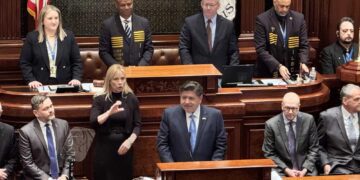Democrat Illinois Governor Pritzker announced a third extension of his lockdown decree – this one until May 30. In response, State Senator Sue Rezin (R-Morris) stated:
“While I am pleased that the Governor made some vitally needed modifications to his stay-at-home order … I fear that the Governor missed a critical opportunity to do more to help the state. I would have liked to see the Governor include some sort of regional consideration for future plans to re-open the state. Illinois is a very diverse state and a one-size-fits-all approach will not work. For many local businesses, this stay-at-home order has had devastating consequences. The Governor needs to recognize that the ongoing COVID-19 health crisis is not impacting the state the same way across all regions.
Earlier Rezin noted that "transparency is a necessary cornerstone of democracy," and announced that she had joined colleagues in the General Assembly in sending a letter to Gov. Pritzker asking for increased transparency on critical issues relating to the state's handling of the COVID-19 pandemic. The letter makes a plea for increased transparency in three key areas:
- Who are the medical experts and leading epidemiologists that the administration is relying on to make consequential decisions concerning life and death and the economy?
- Who are the experts?
- Is the administration consulting experts from other fields? If so, which fields and which experts?
- Will the administration provide a comprehensive list with qualifications and backgrounds?
- Will the administration release more detailed information on the models being used to make key decisions?
- Upon which specific models is the administration relying?
- How do those compare or contrast with the modeling used in other states or at the federal level?
- How have those models and the estimates changed over recent weeks?
- Will the administration release these models for public scrutiny?
- Will the administration release more information about inmates released early from state prisons as a result of the COVID-19 pandemic?
- What are the criteria to make decisions as to who is released?
- Do all of those released fit that criteria?
- If not, who specifically was released that did not fit the criteria, and why were they released?
- Is there a limit to the number of people the Governor is willing to release, regardless of the criteria?
- Are there any violent crimes that are not eligible for release?
- Are there any non-violent crimes that are not eligible for release? As in, are there any non-violent felonies for which someone has been incarcerated, as in burglary, theft, home repair fraud (against seniors in particular) that are not eligible for early release?
- Does an individual's prior criminal history make any difference?
"Transparency is an essential ingredient needed for a well-run government," said Sen. Rezin. "Our constituents have the right to transparency when it comes to our decision-making process during this unprecedented health crisis."







